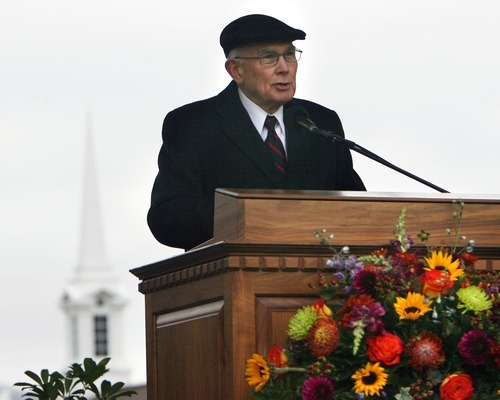This is an archived article that was published on sltrib.com in 2011, and information in the article may be outdated. It is provided only for personal research purposes and may not be reprinted.
Washington • One of the LDS Church's leading voices argues that any reform of the tax code should not reduce or remove the deduction for charitable giving, because doing so would hurt churches, charities and the nation as a whole.
Dallin H. Oaks, a member of the high-ranking Quorum of the Twelve Apostles, addressed the Senate Finance Committee on Monday at the invitation of Sen. Orrin Hatch, R-Utah. He spoke for a group of religious leaders that included a representative of the Catholic and Baptist faiths.
"While we appear here as religious leaders, the possible impairment of the charitable deduction in order to enhance tax revenues is not a religious issue. It is not a political issue. It is not even an economic issue," Oaks said. "It poses a question about the nature and future of America."
Oaks, a former member of the Utah Supreme Court, was among five witnesses who debated possible changes to the charitable deduction before the Finance Committee as its members prepare for a broader tax-reform debate.
The Salt Lake City-based Church of Jesus Christ of Latter-day Saints has long defended the charitable deduction both in Utah and federally. Mormons are expected to give 10 percent of their earnings to the LDS Church as tithing, and they can claim that money as a charitable deduction on their taxes. This is the LDS Church's primary source of funding.
"We are grateful for charitable deductions, which encourage donations to churches and other charities," Oaks wrote in his prepared text. "The effect of this tax benefit is built into the financing of charitable enterprises that are vital to our nation, and it is a significant and wise support of the private sector."
He noted the LDS Church's charitable work after Hurricane Katrina hit New Orleans, which included nearly 3,000 tons of emergency supplies and more than $13 million in cash.
But the committee also heard a number of ideas to change the deduction, including President Barack Obama's call to cap the benefit for wealthy Americans. That idea was not supported by any of the five panelists, but Eugene Steuerle, a fellow at The Urban Institute, did support creating "a floor" for the deduction.
Under this idea, taxpayers could claim the deduction only if they gave a certain percentage of their income, say 2 percent, or a certain dollar amount. This would increase the amount of taxes the government claims, since studies show that small-dollar donors are likely to give with or without the tax incentive. But to counteract that, Steuerle also suggested allowing all taxpayers to claim the deduction, not just those who itemize their returns.
Senate Finance Committee Chairman Max Baucus, D-Mont., didn't endorse any changes, but he did note that only 27 percent of taxpayers benefit from the charitable deduction. People who use the basic tax form cannot write off their charitable giving.
Steuerle argued that allowing all taxpayers to claim the deduction as long as they give enough to reach the floor would create new tax revenue for the government while also spurring more charitable giving.
Hatch, the committee's ranking Republican, expressed skepticism about such proposals.
"Frankly, that sounds too good to be true," he said. "And, as we all know, when something sounds too good to be true, it probably is."
Hatch called all the proposals to change the deduction "radical" and argued it was inappropriate to change the tax break in such economically difficult times when more people were relying on the help of charities.
"Charitable donations are the lifeblood of charities," he said, "and the last thing Congress should do is interrupt the blood supply."
United Way President Brian Gallagher warned that any cap on the deduction or floor that donors would have to meet would result in more legislative attempts to weaken the deduction when the government needs money. And while he argued it is rare that someone gives to gain the tax incentive, he said the deduction does affect how much people donate.
"I can tell you from my experience, large donors are very sensitive to the tax code," he said. "If Congress reduces the charitable deduction, you should expect that donors will simply withhold the difference necessary to cover the tax."
Oaks also touched on the practical impacts of the tax provision, but spent most of his time on the broader implications.
"The law is not only an enforcement mechanism. It's a teaching instrument," he said. "And if the charitable deduction is modified in substance, that will be understood as a teaching message by the government of the United States to its citizens generally that the private sector and charitable works are less important."
Oaks' appearance before the committee marks the first time a high-ranking LDS official testified before Congress since 2002. At that time, H. David Burton, the Utah-based church's presiding bishop, appeared before a House subcommittee to support a bill that would allow the LDS Church to buy federal land at Martin's Cove, Wyo., a historically significant site for the faith. Congress never approved that legislation, but the Bureau of Land Management worked out a long-term lease with the LDS Church in 2004.
Twitter: @mattcanham



